Why did the team in Dubbo start this piece of work?
The over representation of Aboriginal young people in the juvenile justice system has been a concern for the community in Dubbo. In 2012-13, 127 children from Dubbo were detained on either a control or remand order, representing the greatest number of children in detention outside Sydney local government areas. In Dubbo, 96.21% of children detained were Aboriginal.
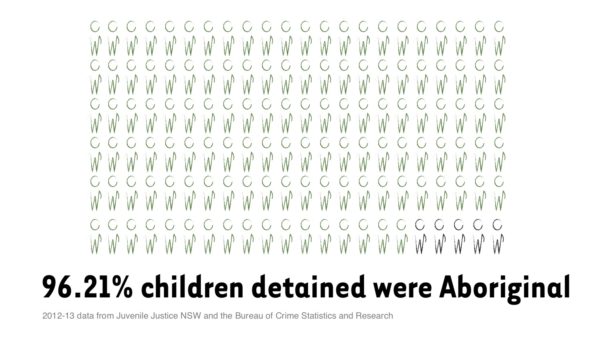
Dubbo Children and Prison Program (CAPP) group phases
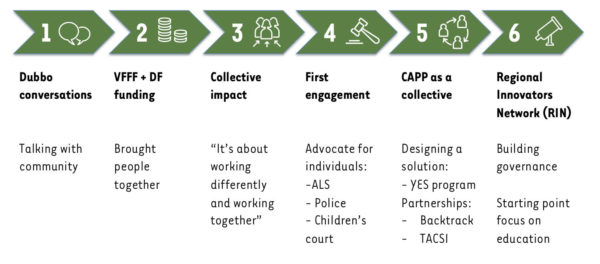
- Dubbo Conversations.
In 2013, Vincent Fairfax Family Foundation (VFFF) and Dusseldorp Forum (DF) made a commitment to support this work funding “Dubbo Conversations”. Between August and December 2014, the team met with a wide variety of people from the community, as shared in the Dubbo Conversations report introduction:
Between August and December 2014, discussions were held with 87 community members and service providers, including 29 young people, 21 community members and 37 agency representatives, many of whom were Aboriginal people living in Dubbo and surrounding areas. Agencies that participated in the consultations included NSW Police, Dubbo PCYC, the local court Magistrate, Juvenile Justice NSW, Apollo House (East Dubbo), Dubbo Regional Aboriginal Health Service, Western Plains Medical Centre, Dubbo Local Aboriginal Land Council, Aboriginal Legal Service NSW/ACT Western Region, NSW Legal Aid, Mission Australia, Uniting Care Burnside, Centacare, Dubbo College Mulgabirra Girls Engagement Program, Yalmambirra Boogijoon Doolin Aboriginal Cultural Camp program, Shine Sistaz Program, University of Sydney School of Rural Health, Neami Mental Health Facility, Mac River Youth Alcohol and Drug Rehabilitation Centre, Taronga Zoo Making Tracks Program, Western NSW Family Referral Service, NSW Families and Community Services and the Dubbo Neighbourhood Centre.
2.Vincent Fairfax Family Foundation (VFFF) and Dusseldorp Forum (DF) funding
The funding from both philanthropic foundations brought a wide group of people together to form a working group. Participants represented various organisations in Dubbo including: Orana Local Area Command, Dubbo Regional Council, Education and Training Out West, Apollo House, Dubbo Neighbourhood Centre, Juvenile Justice and the Aboriginal Legal Service.
The group had the shared goal of creating the conditions to enable better outcomes for young Aboriginal people living in Dubbo.
In the video below, Jason Yelverton, Youth Development Officer at Dubbo Regional Council and a member of the CAPP Working Group, reflects on the journey of the CAPP group and the initial phases:
3. Collective impact
An external facilitator was brought in to train the CAPP Working Group in using the collective impact approach in their work. This was a new way of working for CAPP partners and required the organisations to work differently with an emphasis on working together to enhance outcomes for young people involved with, or heading for the justice system. This involved building a common understanding of the issue, creating a shared purpose, sharing resources and data.
4. First engagement
The data showed that the number one reason Aboriginal young people were coming before the Dubbo Children’s Court was for the breach of bails. The CAPP Working Group responded by advocating for better bail outcomes for Aboriginal young people. Realising that not all the people were at the table to address the issue, CAPP invited ALS to join the Working Group. Partners worked together to ensure realistic bail conditions were made so that young people were not set up to fail.
As a result of this first engagement the CAPP group went on to create the following joint responses:
- For individuals – the CAPP Youth program, which involved taking Aboriginal young people ‘at risk’ to camps at Backtrack and providing after school diversionary activities.
- For the community- CAPP partners joining together to respond to a spike in youth crime in the central business district of Dubbo
- For the system – CAPP partners worked with the NSW Children’s Court to provide information and assistance in expanding the Youth Koori Court to Dubbo
5. CAPP as a collective
The CAPP Working Group started working with a disengaged group of young people to explore ways to engage them in learning, increase their wellbeing and their positive contribution to the community. As a result of a collaborative work between the CAPP group members a partnership with BackTrack was formed and the young people also participated in the TAFE Pilot YES Program. This is a program in which young people engaged in learning and are exposed to hands on vocational skills.
Through this work CAPP generated new partnerships with a wide variety of stakeholders including the local school and TAFE.
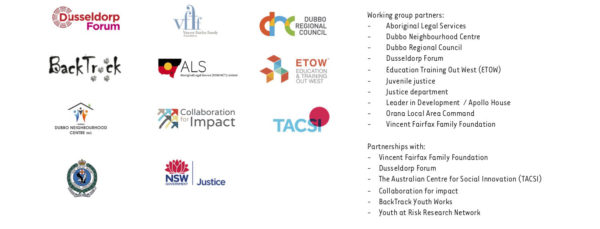
6. Regional Innovator’s Network (RIN)
In the current phase, the CAPP group has been an active member to reflect and share their knowledge on what does it take to develop innovation work in regional communities.
Through their involvement in RIN, the CAPP group has developed three key pieces of work that we introduce below:
6.1. Building a shared vision – Theory of Change
6.2. ‘How we are going to work together’ framework
6.3. Discovery work on Education with the community
6.1. Building a shared vision – Theory of Change
TACSI with the CAPP Working Group, facilitated conversations and sessions to:
- Frame the broad goal that CAPP partners were working towards and
- Identify the high-level pathways that they believe they could follow to achieve it.
Below is the map that resulted from that exercise:
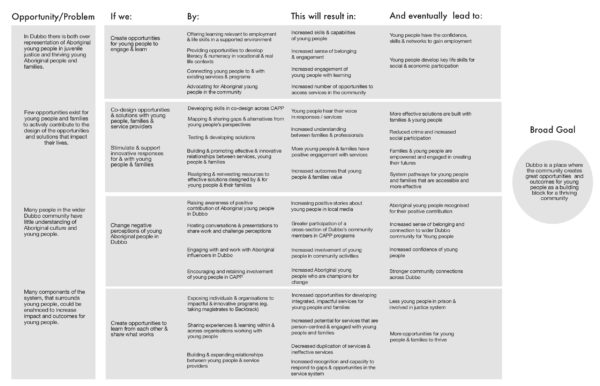
Based on the current situation in the community, the team agreed that they wanted to focus on two areas as a starting point:
- Create opportunities for young people to engage & learn
- Co-design opportunities & solutions with young people, families & service providers
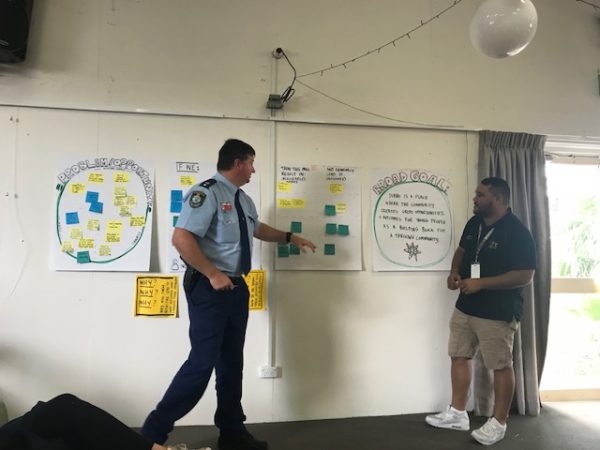
6.2. ‘How we are going to work together’ framework
Through the experience of working together, the CAPP group has identified teams that need to work side by side to achieve the outcomes that they are seeking, and to influence a systemic change in their community. Working collaboratively a governance model has been developed to facilitate and progress this work. We have also framed the responsibilities, key activities for each of team and the relationships between them.
As shown in the visual below, the key group that goes across all the rest is “Community”. It is the one that sits at the centre of everything that the CAPP group will be doing and we will explore ways with them to actively have their involvement. The team that will work closely with the community are the “Co-design” group. The Co-design group will use a collaborative and generative approach to identify opportunities to do things differently from the communities perspective and frame it to share it with the rest of the groups and more broadly. The next team is the “Knitters”. They are the ones linking initiatives and people. The Knitters add the holistic and strategic view to the work to ensure that relevant information is being shared amongst the groups. The last group is the “Creating the Conditions”. It is formed by decision-makers across different organisations and their role will be to open doors, influence others and to continuously update the vision based on what the other groups will be sharing.
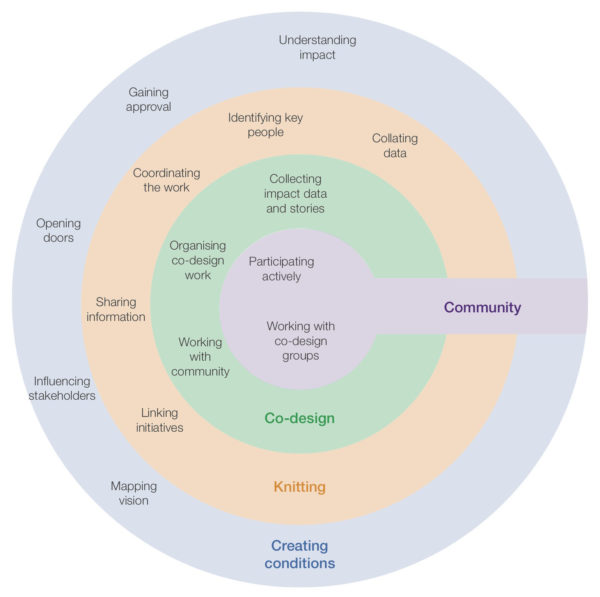
6.3. Discovery work on Education with the community
The CAPP group is currently developing a discovery piece of work with the community to explore what are the things that help Aboriginal young people to learn and what are the things that get in the way for them. They have also shared some ideas on how the experiences and current situation of these young people could be improved.
We have conducted semi-structured interviews with:
- 4 boys attending Year 9
- 3 girls attending Year 11
- 4 parents of these young people
- 10 experts in the education space and healthcare space
- 4 Aboriginal representatives from different groups in the community
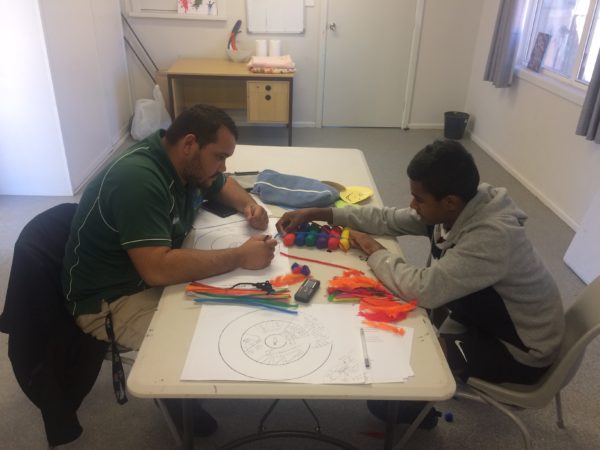
We have synthesized the content in themes and profiles (find the boards with the content attached).
Key themes:
- Connection to culture
- Holistic approach to education
- Meaningful learning environments
- Social and emotional resilience
- Safe and caring relationships
The five young people profiles are:
- Class is overwhelming
- Schools favours the white kids – “I’m not interested”
- School is boring
- School is not the right environment
- I don’t care about school
CAPP team learnings and achievements
Reflecting on the work of the CAPP Group over the past three years, we have captured the following learnings:
- How to build strong relationships
- Don’t jump into the solution, stay in the problem (not too long)
- Be intentional
- How to have honest conversations
- How to debrief properly
- Build resilience and feel comfortable with ambiguity
- Be curious and be prepared to continuously learn
We have had challenging times and also times to celebrate. Regarding achievements, we have developed joint initiatives for:
- Individuals: CAPP Youth Program
- Community: a joint response to the spike in Youth crime
- System: information and assistance to the NSW Children’s Court on establishing a Youth Koori Court in Dubbo
What now and what next?
Currently the CAPP group will be working on:
- Conversations with young people and families
- Conversations with people working in the Education sector
- Theory of Change with police
- Theory of Change with Apollo House
And in the following months we plan to focus on:
- Communicate learnings (insights) from conversations
- Expanding what is happening in the different groups: creating the conditions, knitters, co-design
- Identifying and testing opportunities with young people and community
For more information
If you have any questions or are curious about this work, feel free to contact Sharon Tomas who is the group’s Community Coordinator: sharontomas@cappdubbo.org